Disruption expected as junior doctors' strike called off
- Published

Hospitals across England are facing major disruption with the cancellation of thousands of operations, despite a 24-hour strike by junior doctors being called off.
The British Medical Association agreed to suspend the walk-out following a last-minute breakthrough in talks.
But it came too late for hospitals - more than 4,000 patients have already had their treatment delayed.
Two more walk outs planned for later in December have also been suspended.
The move was announced after an outline agreement was reached between the two sides following talks at conciliation service Acas.
The decision to suspend the strikes only came on Monday night - just hours before the first walk-out was due to begin at 08:00 on Tuesday.
Temporary suspension
Both sides will now spend the next few weeks going through the detail of the agreement. To allow that to happen, the BMA has agreed to suspend all three days of action.
But the joint statement - sent out by Acas - makes it clear it is only a temporary move at this stage. It points out the BMA has until 13 January to start industrial action if the next round of talks does not reach a permanent deal.
Matthew Hopkins, chief executive for Barking, Havering and Redbridge University Hospitals NHS Trust, told BBC Radio 5 Live they were "trying to get back to business as usual as quickly as we can today".
He said their outpatients had been told to go to appointments at the trust's hospitals if the strike was cancelled and they were "keen to reschedule operations" as 47 had been postponed.

'My operation was cancelled over strike plans'
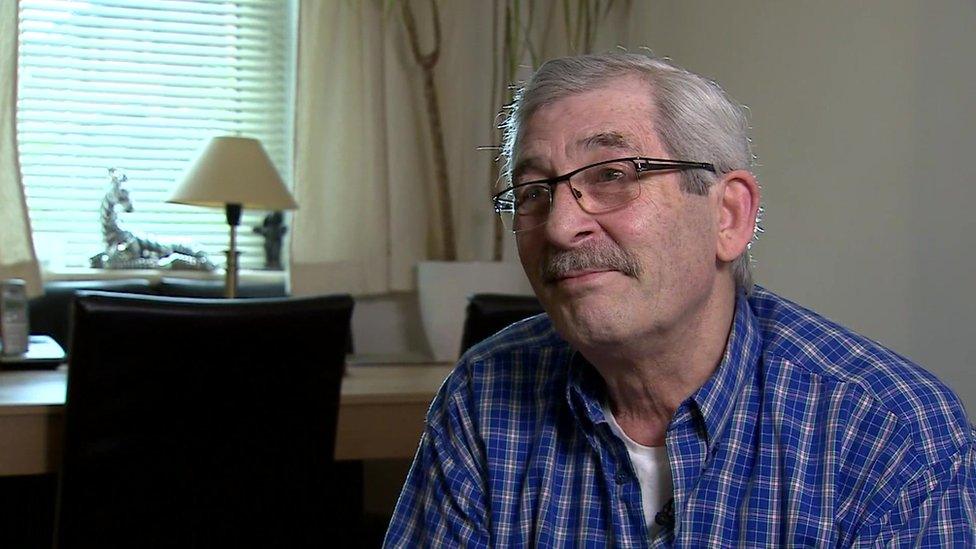
Tony Moule, 68, was due to have an operation to relieve severe back pain on Tuesday.
But he says a few weeks ago he received a call from the deputy operations manager at his hospital and was told the surgery had to be called off for "safety reasons" in case there were not enough staff at work during strike action.
It was the fourth time his operation had been cancelled.
He is frustrated that a procedure he has been waiting for since September - and that he feels could make a big difference to his quality of life - has been put off again.
He says: "As soon as I am on my feet the pain is there and the longer that I am on my feet - in the shower or when I am washing up for example - the pain is like a knife sticking into me."
But he says he supports the doctors and nurses "100%."
He adds: "I don't blame them. They do a cracking job."

Patient Donald Campbell, whose operation to have a kidney removed was delayed, said: "It is a great disappointment, it is another nine days of worry before I can get on with my life."
The BBC understands hospitals have already cancelled more than 4,000 routine operations and treatments, including knee and hip replacements, that were due to take place on Tuesday. They were told by ministers to start planning for strike action once the BMA announced the dates in early November.
That figure represents between 10% to 15% of operations and procedures. On top of that many more appointments and check-ups have had to be postponed - although cancer care has been prioritised and has remained unaffected in many places.

What is the dispute about?
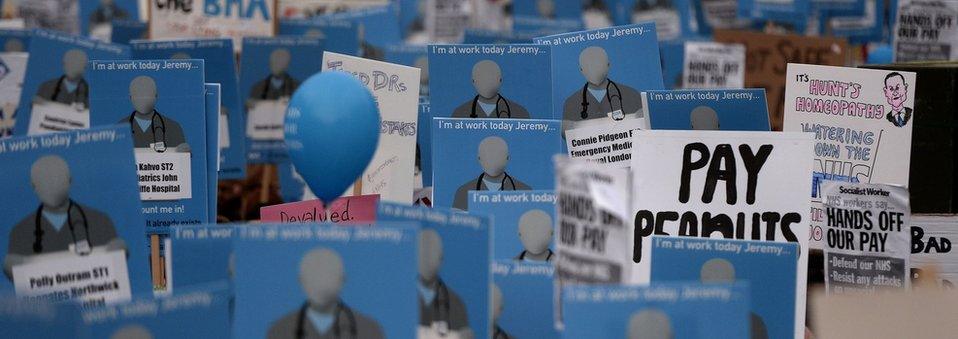
The row between junior doctors and the government is over a new contract
Talks broke down last year, but the dispute has escalated in recent months after ministers said they would impose the deal next summer
Ministers have offered doctors an 11% rise in basic pay, but this has been offset by curbs to other elements of the pay package, including unsociable hours payments
The government has said the changes are need to create more seven-days services, but the BMA has warned it could lead to doctors being over-worked because safeguards to keep a lid on excessive hours are being weakened
A series of protests have been held across the country and 98% of BMA members who took part in the ballot backed strike action
Strike action was planned for 1 December (with doctors covering emergency care) and on 8 and 16 December, which would have been a complete walk-out

However, the impact at different hospitals has varied greatly.
Airedale Hospital NHS Foundation Trust has cancelled 100 operations - 80% of the total planned - while the Norfolk and Norwich trust has cancelled less than a tenth - 11 out of 150.
The Victoria Derbyshire programme asks: What does each side wants from the talks?
At University Hospitals of Leicester NHS Trust, 68 operations have been cancelled in advance - 18% of the total - and 740 appointments - 16% of the total - have been cancelled.
Meanwhile, Nottingham University Hospitals has cancelled 40 operations - just over a quarter of the total - and nearly a tenth of its 4,500 appointments.
'Best interests'
Children's services have also been affected. Sheffield Children's Hospital NHS Trust said "detailed planning" had taken place to ensure all those in hospital would get high-quality care.
But to ensure that happens, 11% of appointments and 7% of operations had had to be re-arranged.
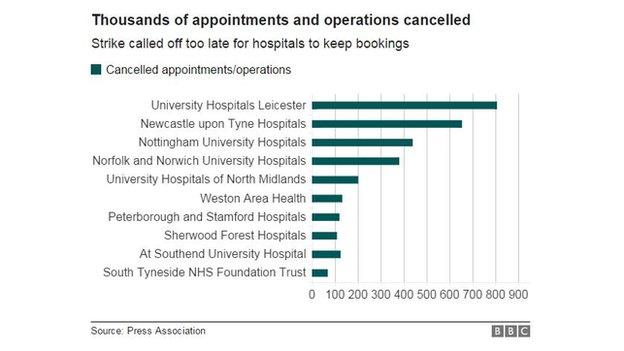
Hospital appointments cancelled
GP services, by comparison, have remained largely unaffected. While GP trainees were due to take strike action, they represent a much smaller proportion of the workforce than junior doctors in hospitals.
Dr Barbara Hakin, of NHS England, said the breakthrough was "pleasing".
"This is in the best interests of patients, although we can only apologise for the disruption caused to anyone who has already had their operations cancelled," she said.
On Monday, Health Secretary Jeremy Hunt told the House of Commons that NHS bosses were "making every effort to minimise harm or risks caused by the strike".
He said changes to the contract were needed because it had - along with the consultants' contract which is also being renegotiated - the "unintended consequence of making it too hard for hospitals to roster urgent and emergency care evenly across seven days".
"Our plans are deliberately intended to be good for doctors - they will see more generous rates for weekend work than those offered to police officers, fire officers and pilots," he added.
The BMA has argued that the proposed changes would have put patient safety at risk, as well as meaning doctors would lose out financially in the long-term.

Were you due to have any treatment today? Has your operation been postponed or cancelled? Tell us how you've been affected. Email haveyoursay@bbc.co.uk, external with your stories.
Please include a contact number if you are willing to speak to a BBC journalist. You can also contact us in the following ways:
WhatsApp: +44 7525 900971
Send pictures/video to yourpics@bbc.co.uk, external
Tweet: @BBC_HaveYourSay, external
Send an SMS or MMS to 61124 or +44 7624 800 100
- Published1 December 2015

- Published25 November 2015
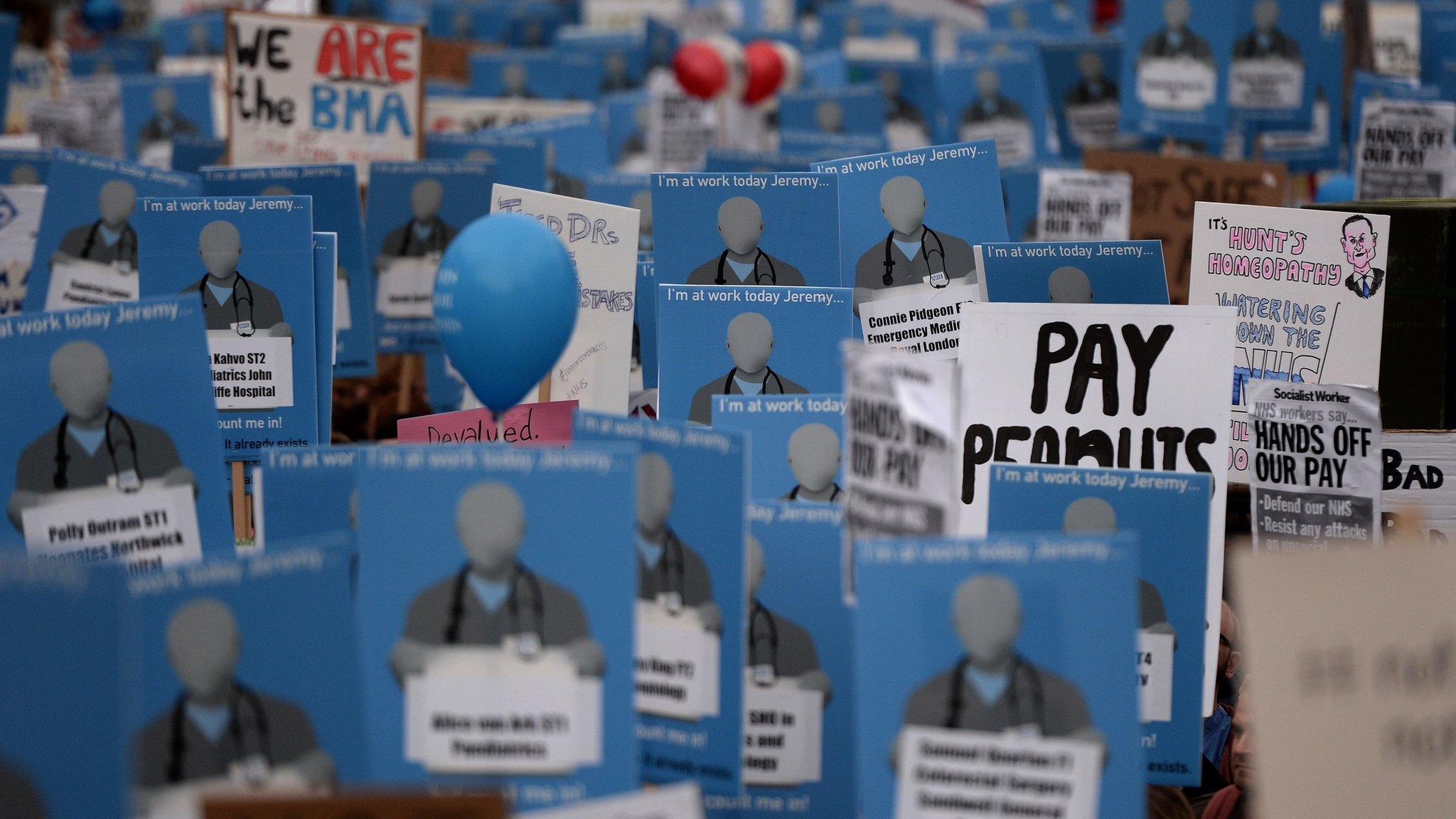
- Published19 November 2015
- Published4 November 2015

- Published4 November 2015

- Published4 November 2015
- Published21 October 2015

- Published4 November 2015

- Published19 October 2015
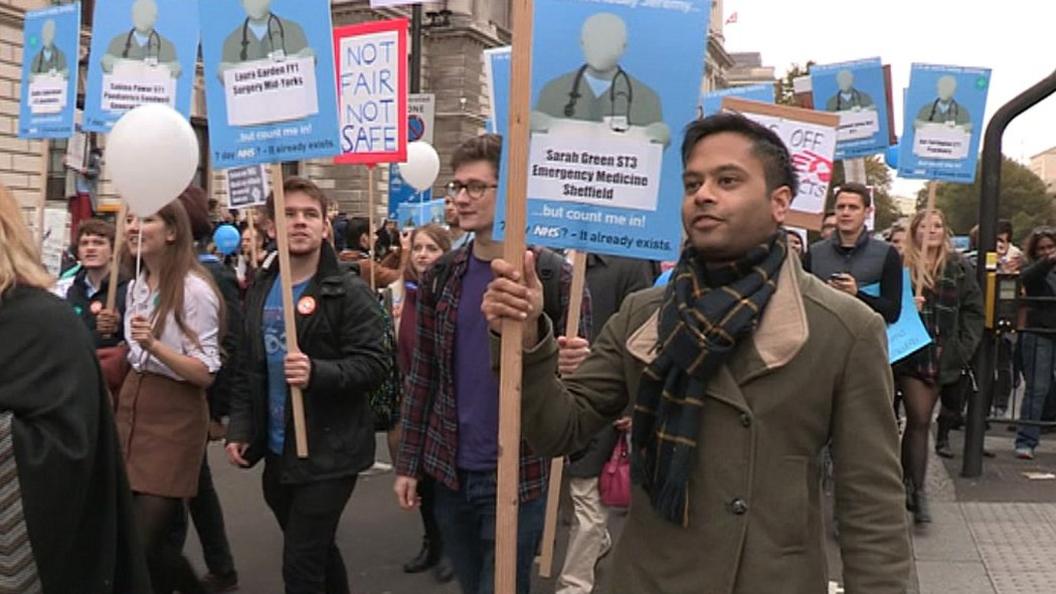
- Published28 September 2015
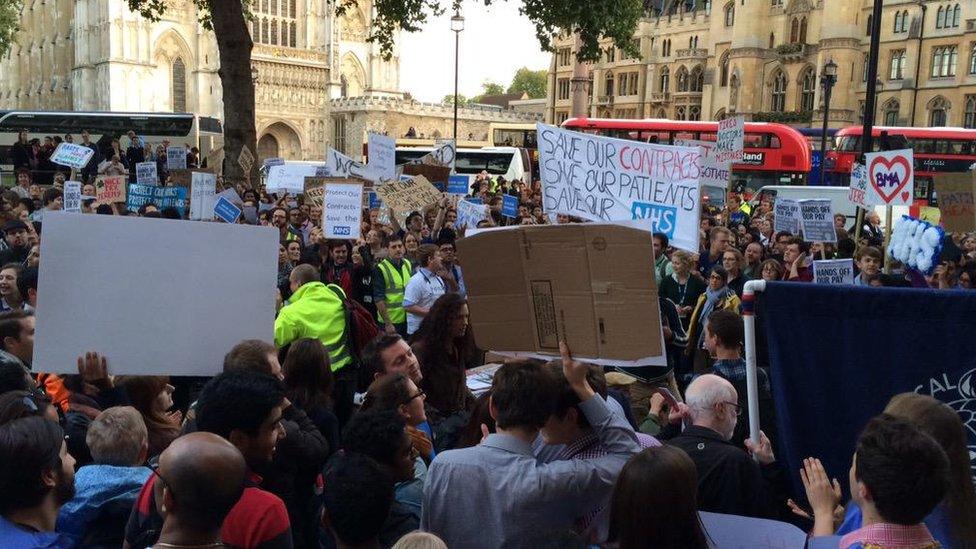
- Published26 September 2015
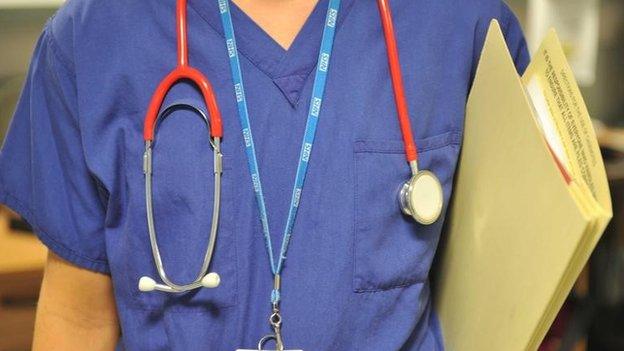
- Published28 September 2015
- Published3 November 2015
